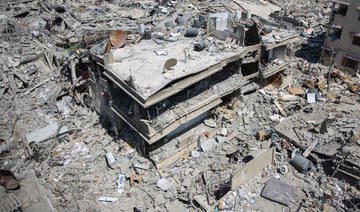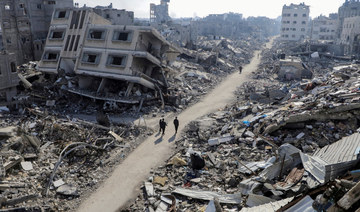LAHORE: Pakistan’s anti-corruption tribunal Wednesday banned opener Sharjeel Khan for five years over a spot-fixing case that has rocked the Pakistan Super League, the latest scandal to taint the sport in the cricket-crazy country.
The 28-year-old dashing left-handed opener was provisionally suspended along with fellow opener Khalid Latif in February for violating the Pakistan Cricket Board (PCB) anti-corruption code.
The charges centred on a match between Islamabad United and Peshawar Zalmi in Dubai in February.
Off four balls, Sharjeel scored a single, failed to score off two deliveries and was then out.
Spot-fixing involves bets on the outcome of a particular passage of play, unlike match-fixing in which there is an attempt to prearrange the result.
Latif, who did not play in the game, was alleged to have orchestrated the deal.
Both were also charged for not reporting the matter to the PCB’s anti-corruption unit.
“Sharjeel is banned for five years, which has two-and-a-half years suspended,” said Asghat Haider, who headed the three-member tribunal.
“We investigated all the charges and found them correct.”
The minimum punishment for the charges was five years with a maximum of a life ban.
Former PCB head Tauqir Zia and erstwhile Pakistan captain Wasim Bari were the other members of the tribunal formed in March.
Under the PCB code players can appeal rulings before an independent arbitrator within 14 days of the decision.
Four other players — Mohammad Irfan, Shahzaib Hasan, Nasir Jamshed and Mohammad Nawaz — were also included in the investigation on multiple charges.
Irfan and Nawaz admitted not reporting the bookie’s offer. Irfan was banned for one year with six months suspended and fined one million rupees ($9,500). Nawaz was banned for two months (one suspended) and fined 200,0000 rupees.
The tribunal is expected to rule on Khalid Latif’s case next month.
Jamshed, who is being investigated by Britain’s National Crime Agency, was said to be the “go between” linking the players and the bookie.
His case and Hasan’s is still under investigation by the tribunal.
Pakistani cricketer Sharjeel banned for five years over spot-fixing
Pakistani cricketer Sharjeel banned for five years over spot-fixing

Arrests follow barricades and encampments as US college students nationwide protest Gaza war
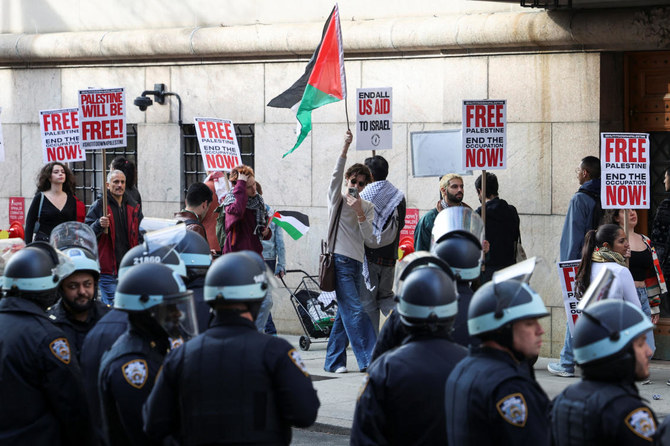
- More than 100 pro-Palestinian demonstrators who had camped out on Columbia University’s upper Manhattan campus were arrested last week
Both are part of intensifying demonstrations over Israel’s war with Hamas by university students across the country, leading to dozens of arrests on charges of trespassing or disorderly conduct.
Columbia’s President Minouche Shafik in a statement Wednesday set a midnight deadline to reach an agreement with students to clear the encampment, or “we will consider alternative options.”
That deadline passed without news of an agreement. Videos show some protesters taking down their tents while others doubled down in speeches. The heightened tension arrived the night before US House Speaker Mike Johnson’s trip to Columbia to visit with Jewish students and address antisemitism on college campuses.
Across the country, protesters at California State Polytechnic University, Humboldt, started using furniture, tents, chains and zip ties to block the building’s entrances Monday evening. The defiance was less expected in the conservative region of California, some 300 miles (480 kilometers) north of San Francisco.
“We are not afraid of you!” the protesters chanted before officers in riot gear pushed into them at the building’s entrance, video shows. Student Peyton McKinzie said she was walking on campus Monday when she saw police grabbing one woman by the hair, and another student having their head bandaged for an injury.
“I think a lot of students are in shock about it,” she told The Associated Press.
Three students have been arrested, according to a statement from Cal Poly Humboldt, which shutdown the campus until Wednesday. An unknown number of students had occupied a second campus building Tuesday.
The upwelling of demonstrations has left universities struggling to balance campus safety with free speech rights. Many long tolerated the protests, which largely demanded that schools condemn Israel’s assault on Gaza and divest from companies that sell weapons to Israel.
Now, universities are doling out more heavy-handed discipline, citing safety concerns as some Jewish students say criticism of Israel has veered into antisemitism.
Protests had been bubbling for months but kicked into a higher gear after more than 100 pro-Palestinian demonstrators who had camped out on Columbia’s upper Manhattan campus were arrested Thursday.
By late Monday at New York University, police said 133 protesters were taken into custody and all had been released with summonses to appear in court on disorderly conduct charges.
In Connecticut, police arrested 60 protesters — including 47 students — at Yale, after they refused to leave an encampment on a plaza at the center of campus.
Yale President Peter Salovey said protesters had declined an offer to end the demonstration and meet with trustees. After several warnings, school officials determined “the situation was no longer safe,” so police cleared the encampment and made arrests.
In the Midwest on Tuesday, a demonstration at the center of the University of Michigan campus had grown to nearly 40 tents, and nine anti-war protesters at the University of Minnesota were arrested after police took down an encampment in front of the library. Hundreds rallied to the Minnesota campus in the afternoon to demand their release.
Harvard University in Massachusetts has tried to stay a step ahead of protests by locking most gates into its famed Harvard Yard and limiting access to those with school identification. The school has also posted signs that warn against setting up tents or tables on campus without permission.
Literature Ph.D. student Christian Deleon said he understood why the Harvard administration may be trying to avoid protests but said there still has to be a place for students to express what they think.
“We should all be able to use these kinds of spaces to protest, to make our voices heard,” he said.
Ben Wizner, a lawyer with the American Civil Liberties Union, said college leaders face extremely tough decisions because they have a responsibility to ensure people can express their views, even when others find them offensive, while protecting students from threats and intimidation.
The New York Civil Liberties Union cautioned universities against being too quick to call in law enforcement in a statement Tuesday.
“Officials should not conflate criticism of Israel with antisemitism or use hate incidents as a pretext to silence political views they oppose,” said Donna Lieberman, the group’s executive director.
Leo Auerbach, a student at the University of Michigan, said the differing stances on the war hadn’t led to his feeling unsafe on campus but he has been fearful of the “hateful rhetoric and antisemitic sentiment being echoed.”
“If we’re trying to create an inclusive community on campus, there needs to be constructive dialogue between groups,” Auerbach said. “And right now, there’s no dialogue that is occurring.”
At the Massachusetts Institute of Technology, physics senior Hannah Didehbani said protesters were inspired by those at Columbia.
“Right now there are several professors on campus who are getting direct research funding from Israel’s ministry of defense,” she said. “We’ve been calling for MIT to cut those research ties.”
Protesters at the University of California, Berkeley, which had an encampment of about 30 tents Tuesday, were also inspired by Columbia’s demonstrators, “who we consider to be the heart of the student movement,” said law student Malak Afaneh.
Campus protests began after Hamas’ deadly attack on southern Israel, when militants killed about 1,200 people, most of them civilians, and took roughly 250 hostages. During the ensuing war, Israel has killed more than 34,000 Palestinians in the Gaza Strip, according to the local health ministry, which doesn’t distinguish between combatants and noncombatants but says at least two-thirds of the dead are children and women.
Pakistan’s independent election monitor says by-poll irregularities overshadowed improved result management
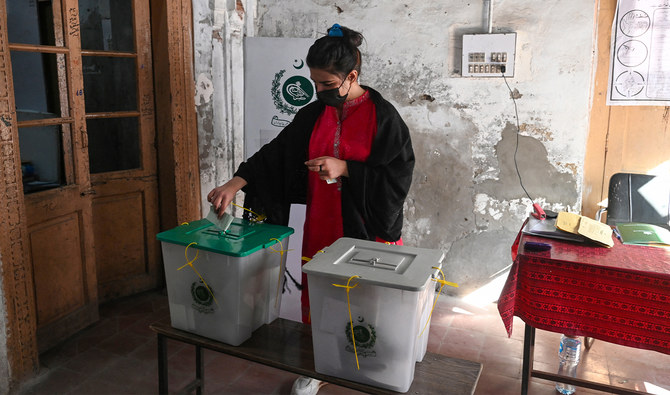
- FAFEN says its observers were stopped from monitoring elections at 19 polling stations in two Punjab constituencies
- It mentions a decline in the number of votes cast despite an overall increase in registered voters since February 8
ISLAMABAD: An independent election monitoring network in Pakistan highlighted low voter turnout and procedural irregularities in provincial constituencies in Punjab on Tuesday, saying such teething issues dominated improved result management in the by-polls held on April 21.
Established in 2006, the Free and Fair Election Network (FAFEN) aims to promote electoral transparency, integrity and fairness in Pakistan through citizen observation and advocacy efforts.
It operates independently, monitoring various aspects of the electoral process, including voter registration, polling procedures and result tabulation to ensure impartial elections in the country.
“Low voter turnout, procedural irregularities and restrictions on independent observation in two provincial constituencies in Punjab overshadowed the improved results management and lower numbers of ballots excluded from the count during April 21 elections in 22 national and provincial assembly constituencies,” FAFEN said in its report on by-elections.
“Polling station establishment, voter identification, and counting at polling stations were observed to have been largely compliant with law and procedures,” it continued. “However, instances of omissions in ballot issuance requirements by Assistant Presiding Officers (APOs) were reported from around 14 percent of the observed polling stations.”
FAFEN said while polling agents and accredited observers could generally access voting and counting process, security officials or Presiding Officers barred its observers at 19 polling stations in PP-36 Wazirabad and PP-22 Chakwal-cum-Talagang.
“In PP-22, the accreditation process of FAFEN observers was also delayed until the midday on the polling day causing last-minute changes in the observation scope,” it added.
The report said nearly 36 percent of registered voters cast their votes on polling day, which was nine percent less than the turnout in 18 of these constituencies on February 8.
Votes polled by women decreased by 12 percent, while votes polled by men declined by nine percent, despite an increase of 75,640 registered voters, including 37,684 men and 37,956 women compared to the general elections.
“Lahore’s five constituencies recorded the sharpest decline in the voter turnout with PP-147 reporting a mere 14 percent as against 35 percent on February 8,” it noted. “Similarly, NA-119 Lahore registered a 19 percent turnout against 39 percent on February 8. However, the voter turnout in Gujrat and Khuzdar constituencies recorded an increase compared to general elections.”
FAFEN said it deployed 259 Election-Day observers, including 187 men and 72 women, to observe the voting and counting processes at 1,036 polling stations in five National Assembly and 17 Provincial Assembly constituencies in Punjab, Balochistan and Khyber Pakhtunkhwa provinces.
It said that its report was based on the observations received on Election Day from 532 polling stations through FAFEN Election Day Observation mobile application.
US warns of sanctions risk as Iran, Pakistan agree to boost trade ties with new agreements
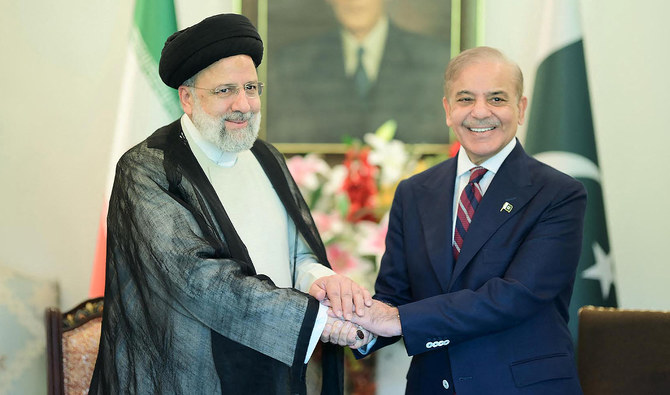
- State Department statement came as the Iranian president concluded his Pakistan visit to discuss energy and connectivity
- US also defends its decision to impose sanctions against four international entities supplying missile components to Pakistan
ISLAMABAD: The United States warned on Wednesday countries doing business with Iran faced the “potential risk of sanctions,” as President Ebrahim Raisi concluded a three-day visit to Pakistan where his government signed eight memoranda of understanding (MoUs) for cooperation in different fields and to boost trade to $10 billion.
The Iranian president arrived in Islamabad on Monday as the two Muslim neighbors sought to mend ties after unprecedented tit-for-tat military strikes earlier this year. The visit also took place as tensions continued to remain high in the Middle East after Iran launched airstrikes on Israel a week ago and Israel retaliated with its own attack on Friday.
During his stay in Pakistan, Raisi held several official meetings in Islamabad, Lahore and Karachi to discuss issues related to trade, connectivity, energy and people-to-people contacts.
Asked about his engagements in Pakistan and signing of MoUs, US State Department Deputy Spokesperson Vedant Patel cautioned against possible sanctions in a brief response.
“Just let me say broadly, we advise anyone considering business deals with Iran to be aware of the potential risk of sanctions,” he said. “But ultimately, the Government of Pakistan can speak to their own foreign policy pursuits.”
He was also asked about the US administration’s decision to announce sanctions against three Chinese and one Belarus-based entity supplying missile components to Pakistan last week.
“The sanctions were made because these were entities that were proliferators of weapons of mass destruction and the means of their delivery,” Patel said. “These were entities based in the PRC [Peoples Republic of China], in Belarus, and that we have witnessed to have supplied equipment and other applicable items to Pakistan’s ballistic missile program.”
“We’re going to continue to disrupt and take actions against proliferation networks and concerning weapons of mass destruction procurement activities wherever they may occur,” he added.
Argentina seeks arrest of Iran minister, recently in Pakistan, over 1994 Jewish center bombing
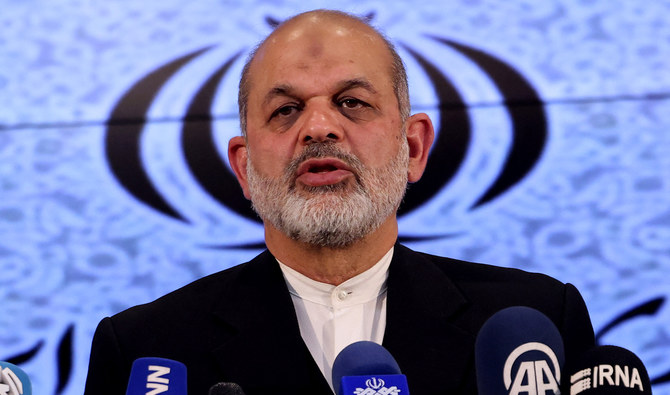
- Argentina contacted Interpol and asked Pakistani, Sri Lankan governments to arrest Iran’s interior minister
- The 1994 bombing has never been claimed or solved, but Argentina has suspected Iran to be behind the attack
BUENOS AIRES: Argentina has asked Interpol to arrest Iran’s interior minister over the 1994 bombing of a Jewish community center in Buenos Aires that killed 85 people, the foreign ministry said Tuesday.
That minister, Ahmad Vahidi, is part of an Iranian delegation visiting Pakistan and Sri Lanka, and Interpol has issued a red alert seeking his arrest at the request of Argentina, the ministry said in a statement.
Argentina has also asked those two governments to arrest Vahidi, it added.
On April 12 a court in Argentina placed blame on Iran for the 1994 attack against the AMIA Jewish community center in Buenos Aires and for a bombing two years earlier against the Israeli embassy, which killed 29 people.
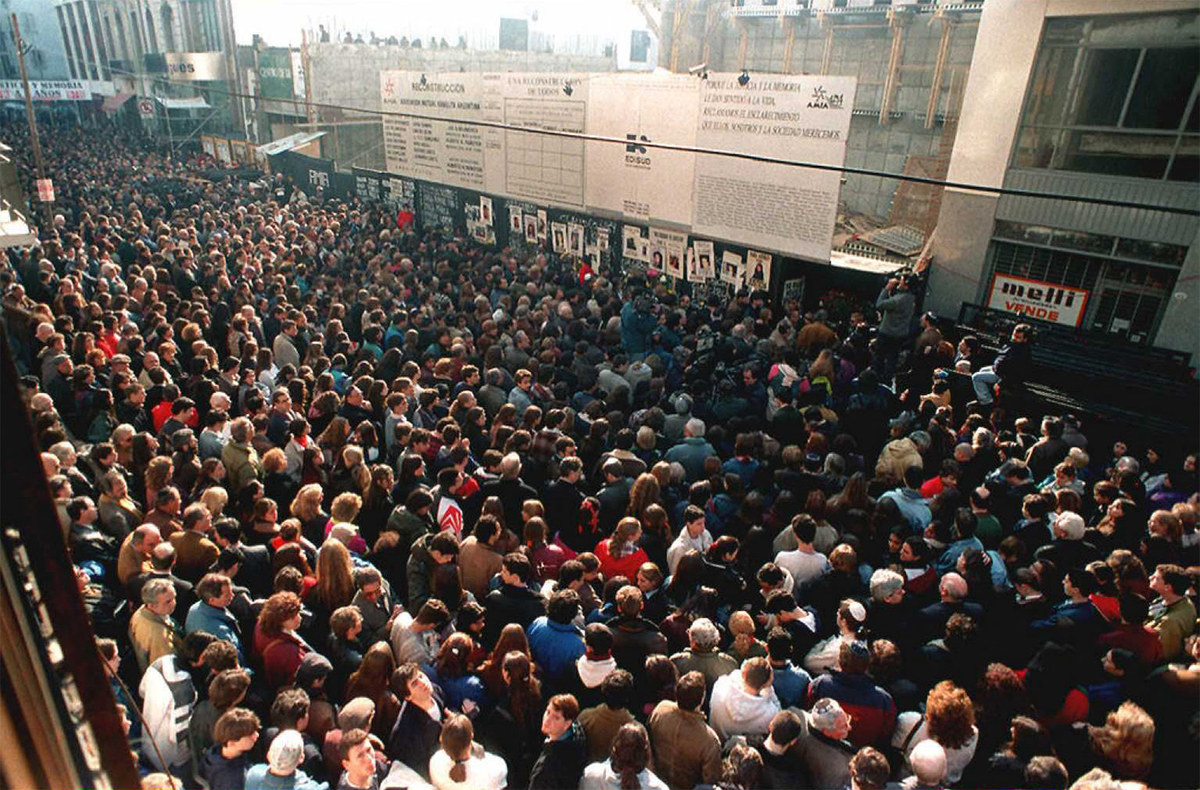
The 1994 assault has never been claimed or solved, but Argentina and Israel have long suspected the Iran-backed group Hezbollah carried it out at Iran’s request.
Prosecutors have charged top Iranian officials with ordering the attack, though Tehran has denied any involvement.
The court also implicated Hezbollah and called the attack against the AMIA — the deadliest in Argentina’s history — a “crime against humanity.”
Tuesday’s statement from the foreign ministry said: “Argentina seeks the international arrest of those responsible for the AMIA attack of 1994, which killed 85 people, and who remain in their positions with total impunity.”
“One of them is Ahmad Vahidi, sought by Argentine justice as one of those responsible for the attack against AMIA,” said the statement, which was co-signed by the security ministry.
Argentina has the largest Jewish community in Latin America, with some 300,000 members. It is also home to immigrant communities from the Middle East — from Syria and Lebanon in particular.
US Senate approves $95 billion aid bill to support Ukraine, Israel war effort

- Ukraine, who has been been on the back foot in its war against Russia, welcomed the vote
- Israel, which has killed more than 34,000 in Gaza, plans to attack Rafah to free hostages held by Hamas
WASHINGTON: A sweeping foreign aid package easily passed the US Congress late on Tuesday after months of delay, clearing the way for fresh Ukraine funding amid advances from Russia’s invasion force and Kyiv’s shortages of military supplies.
The Senate approved by 79 to 18 four bills passed by the House of Representatives on Saturday, after House Republican leaders abruptly switched course last week and allowed a vote on the $95 billion in mostly military aid for Ukraine, Israel and Taiwan and US partners in the Indo-Pacific.
The four bills were combined into one package in the Senate.

The largest provides $61 billion in critically needed funding for Ukraine; a second provides $26 billion for Israel and humanitarian aid for civilians in conflict zones around the world, and a third mandates $8.12 billion to “counter communist China” in the Indo-Pacific.
A fourth, which the House added to the package last week, includes a potential ban on the Chinese-controlled social media app TikTok, measures for the transfer of seized Russian assets to Ukraine and new sanctions on Iran.
Biden has promised to sign the measure into law as soon as it reaches his desk, and his administration is already preparing a $1 billion military aid package for Ukraine, the first to be sourced from the bill, two US officials told Reuters.
The Senate’s Democratic and Republican leaders predicted that Congress had turned the corner in putting Russian President Vladimir Putin and other foreign adversaries on notice that Washington will continue supporting Ukraine and other foreign partners.
“This is an inflection point in history. Western democracy perhaps faced its greatest threat since the end of the Cold War,” Democratic Majority Leader Chuck Schumer said in the Senate.
The aid package could be the last approved for Ukraine until after elections in November when the White House, House of Representatives and one-third of the Senate are up for grabs.
Much of the opposition to the security assistance in both the House and Senate has come from Republicans with close ties to former US President Donald Trump, a Ukraine aid skeptic who has stressed “America First” policies as he seeks a second term.
Senate Republican Leader Mitch McConnell, a strong advocate for assisting Ukraine, expressed regret about the delay, largely due to hard-line Republicans’ objections to adding more to the $113 billion Washington had authorized for Kyiv since Russia began its full-scale invasion in February 2022.
“I think we’ve turned the corner on the isolationist movement,” McConnell told a news conference.
Some of the Ukraine money — $10 billion in economic support — comes in the form of a loan, which Trump had suggested. But the bill lets the president forgive the loan starting in 2026.
HUMANITARIAN CONCERNS
The influx of weapons should improve Kyiv’s chances of averting a major breakthrough in the east by Russian invaders, although it would have been more helpful if the aid had come closer to when Biden requested it last year, analysts said.
It was not immediately clear how the money for Israel would affect the conflict in Gaza. Israel already receives billions of dollars in annual US security assistance, but it more recently has faced its first direct aerial attack by Iran.
Aid supporters hope the humanitarian assistance will help Palestinians in Gaza, which has been devastated by Israel’s campaign against Hamas to retaliate for Oct. 7 attacks that killed 1,200 people.
Gaza health authorities say the campaign has led to the deaths of more than 34,000 civilians in the Palestinian enclave.
It was the second time this year that the Democratic-led Senate passed security aid for Ukraine, Israel and the Indo-Pacific. The last bill, more than two months ago, garnered 70 percent support in the 100-member chamber from Republicans and Democrats. But leaders of the Republican-controlled House would not allow a vote on the foreign aid until last week.
The legislation’s progress has been closely watched by industry, with US defense firms up for major contracts to supply equipment for Ukraine and other US partners.
Experts expect the supplemental spending to boost the order backlog of RTX Corp. along with other major companies that receive government contracts, such as Lockheed Martin , General Dynamics and Northrop Grumman.
The House passed the Ukraine funding by 311-112, with all “no” votes coming from Republicans, many of whom were bitterly opposed to further assistance for Kyiv. Only 101 Republicans voted for it, forcing Speaker Mike Johnson to rely on Democratic support and prompting calls for his ouster as House leader.
However, the House left Washington for a week-long recess, without triggering a vote to remove Johnson.


